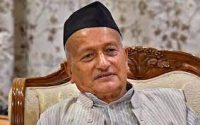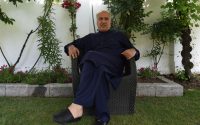Chandigarh: CAA is essentially anti-poor, says former IAS officer Kannan Gopinathan.
Source – indianexpress.com
“The CAA is essentially an anti-poor exercise which is now being marketed as a religious exercise,” said Kannan Gopinathan, a former IAS officer, who resigned from the Indian Administrative Services over the government’s decision to abrogate the Article 370, speaking at a panel discussion on the Citizenship Amendment Act (CAA) held at the Laugh Club in Chandigarh on Sunday.
The panel discussion, involving lawyers and political activists, was organised by city residents for discussing the law without the interference of political affiliations. “This is a safe space where we can ask questions and express opinions without being judged. No one here is allowed to chant slogans or hold posters or claim allegiance to political factions. It is purely an informative, discussion platform,” said Megha, one of the organisers of the panel discussion, as a disclaimer at the beginning of the event.
Gopinathan, who has been actively participating in anti-CAA protests, was allegedly detained by the Uttar Pradesh police on Saturday while he was on his way to Aligarh Muslim University (AMU) to address a protest rally. The former IAS officer had been tweeting throughout his detention to provide updates on where the police was taking him, before he was ultimately released from police custody. “The dialogue and discussion that we are doing here, we cannot conduct in Uttar Pradesh right now. I was planning to do something similar in AMU but they did not even let me reach the venue,” said Gopinathan.
Apart from Gopinathan, the panel consisted of advocates Sarthak Gupta and Shreenath Khemka, city-based activist and lawyer Arjun Sheoran and political activist Kanwaljeet Singh. In an attempt to remain unbiased and conduct dialogue instead of propagating uniformed opinions, the panelists highlighted varied perspectives on the polarising issue which has brought many Indian citizens out on the streets to protest.
“I think, before we get into the argument, we should begin with understanding the rationale behind introducing the CAA,” said Sarthak Gupta, a lawyer practicing at the Punjab and Haryana High court. Gupta traced the history of religious persecution in countries such as Pakistan, Bangladesh and Afghanistan, whose religious minorities excluding Muslims have been granted accelerated naturalization in the CAA. “It is this context that highlights the need for the Act and we should keep that in mind before we proceed to talk about the social and political ramifications of the Act,” said Gupta.
Khemka, another advocate at the panel, continued Gupta’s argument and gave a rationale for the legal basis of the Act, stating that the CAA and NRC exercise are a natural exercise for fortifying India as a modern nation state. “This all goes back to the European concept of nation building, where minorities were not even a concept. It is this understanding that we need to place in the current situation as well,” said Khemka.
However, others on the panel vociferously disagreed with the advocates’ opinion on the implementation of the CAA.
“We can argue all we want over the legal basis of the Act, but it is the lived experience of it’s implementation that ultimately reveals its dangerous political ramifications,” said political activist Kanwaljeet Singh.
“Maybe not all of us will feel the ramifications of these institutional exercises such as the NRC, the CAA and even the NPR now. But migrant populations, the poor and the marginalised, who will be forced to trace their roots to provide proof and go through various bureaucratic hurdles will be unnecessarily tortured by this exercise,” said Singh.
Agreeing with Singh, Gopinathan highlighted that the law will most brutally affect the dispossessed and the marginalised. “It is the Dalit population, the adivasi population, the women of our country, who often do not have documents or the means to avail these documents, who will suffer the most,” said Gopinathan.
“The burden of proving citizenship cannot be on the citizens, because it is the state who has to ensure proper documentation is provided to its people, then how can they ask us to again and again produce documents and prove our citizenship?” said an impassioned Gopinathan.



